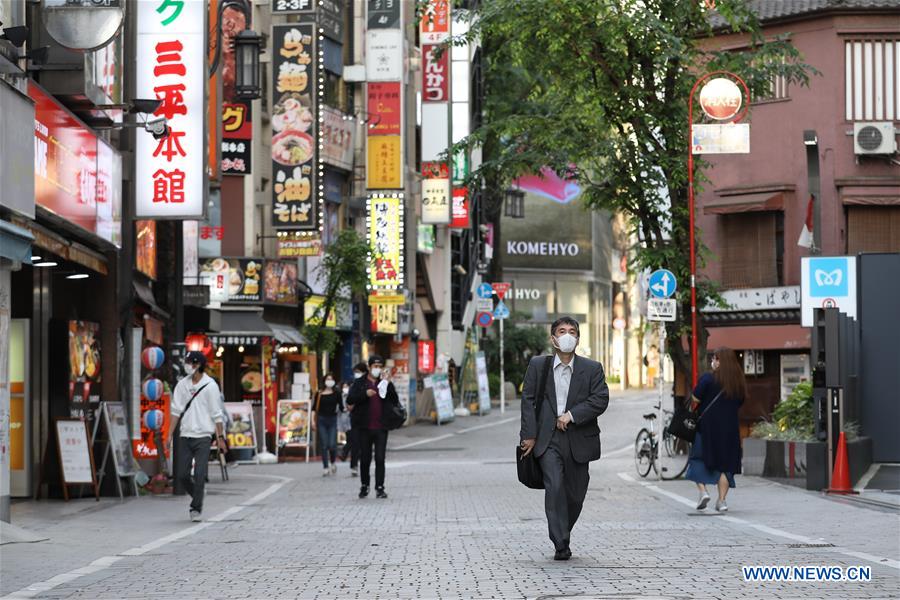
TOKYO: Japanese Prime Minister Shinzo Abe on Monday lifted the COVID-19 state of emergency in the five remaining prefectures still under restrictions, including Tokyo, as the spread of the virus has largely been brought under control.
"Today the government will lift the state of emergency across the nation. We've set some of the most strict criteria in the world to lift the declaration, and we concluded that prefectures across the country have met that standard," the Japanese leader told a press conference.
The five prefectures that had remained under restrictions were Tokyo, Chiba, Kanagawa, Saitama and Hokkaido.
The lifting of the state of emergency came after the government's coronavirus advisory panel showed support for the move earlier in the day.
The emergency measures were issued first for Tokyo, Osaka and five other urban areas on April 7, before being expanded nationwide in mid-April and with the deadline extended thereafter until the end of May.
The advisory panel had been focusing on criteria for the emergency period being lifted which was based around the number of newly reported cases over the past week, the availability of medical resources, and the capacity to provide virus tests and monitor the spread of the virus.
"The advisory panel has agreed that all prefectures no longer need to be under a state of emergency and that lifting the declaration is appropriate," Economic Revitalization Minister Yasutoshi Nishimura said, adding that the situation would be closely monitored and reviewed every three weeks.
Nishimura also said that social and economic activities, including large-scale events, would be phased back in, although people would still be asked not to travel across prefecture lines until the end of the month.
The government, while showing caution amid the coronavirus pandemic, has been keen to see the economy fully reopened as the five prefectures that had remained under emergency restrictions account for around one-third of the country's gross domestic product.
Data released by the government showed that Japan's economy shrank for a second straight quarter in the January-March period and entered a technical recession under the impact of the pandemic.
The Cabinet Office said the economy shrank by an annualized real 3.4 percent in the January-March period from the previous quarter.
The decrease in the quarter corresponds to a 0.9-percent decline on a seasonally adjusted quarterly basis, the Cabinet Office said.
The Japanese leader is now tasked with ushering in a "new normal" for the society, which balances the rejuvenation of the economy with guarding against an explosive second wave of COVID-19 infections.
Abe had said earlier that another state of emergency could be declared if the country is faced with a second wave of infections.
"Our businesses and daily routines will be completely disrupted if we continue with strict curbs on social and economic activity. From now on, it's important to think about how we can conduct business and live our lives while still controlling the risk of infection," Abe said.
He said wearing face masks in public should be kept up and social distancing measures maintained. Abe also said that teleworking does not need to be immediately halted as medical experts have warned that relaxing too many restrictions too soon could trigger another wave of infections.
As for the greater Tokyo area, Tokyo Governor Yuriko Koike offered her thanks to the people for their efforts to help contain the pneumonia-causing virus, but warned them to remain cautious and not to let their guards down.
"There could be a second or third wave of infections so I need to ask the citizens of Tokyo for their continued cooperation," Koike said.
Under Koike's stewardship, the Tokyo metropolitan government has set out a roadmap toward resuming economic and social activities in the nation's capital. The roadmap has been divided into three phases.
Phase one, which could kick off as soon as Tuesday, will see restrictions begin to be eased on museums and libraries. Restaurants and bars in this phase will be allowed to stay open until 10:00 p.m., beyond the previous closing time of 8:00 p.m. under the prior emergency measures.
The second phase, possibly to begin at the end of the month, involves easing the restrictions for cinemas and theaters and cram schools, while the final phase will allow restaurants to stay open until midnight and amusement parks and pachinko parlors to reopen, although high-risk businesses like karaoke bars, gyms and hostess bars will be requested to stay closed.
Professional sports, including baseball and basketball leagues, will be allowed to resume without spectators from June 19, according to the government's latest plans issued Monday.
High schools that fall under the auspices of the Tokyo metropolitan government will be phased back in, with students rotating between classes and online learning. The number of students attending regular classes will be gradually increased, with the situation being constantly monitored, Tokyo officials said.
For the city to move to the next phase, there must be fewer than 20 daily infections on average across a week, with the percentage of untraceable cases remaining below 50 percent. The number of total weekly infections must be lower than the previous week, while the number of seriously ill, testing capacity and medical facilities' occupancy rates will also be factored in, the officials said,
"Recently, the number of new cases in Tokyo has been relatively low. If this welcome trend continues, we may progress along the roadmap more quickly than expected. We want to be flexible," Koike has said.
According to the latest figures on Monday evening from the health ministry and local authorities, 17 new COVID-19 infections were confirmed nationwide, bringing the total to 16,628 cases.
The death toll in Japan from the pneumonia-causing virus, including those from a cruise ship that had been quarantined in Yokohama, totals 864 people.